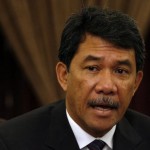French national railway company, SNCF Group, is optimistic the timeline of the 300-kilometer high-speed rail (HSR) task connecting Kuala Lumpur and Singapore will be met.
According to its Senior Vice-President Business Development for India, South Asia and South-East Asia, Philippe Lorand, there was a decent level of understanding of the plan and of the challenging choices to be taken.
“So I am truly optimistic about the timing,” he told Bernama at the Gare de Lyon railway station recently.
SNCF Group, which has five major units, SNCF Logistics, SNCF Keolis, SNCF Arep, SNCF Voyages and SNCF Systra, is included in logistics, mass transit, long distance traveler rail and rail engineering and consultancy.
SNCF Systra, whose main business is outline and improving urban transport frameworks, is included in the HSR project.
It is in charge for an overall high-speed train plan specifications, track, signalling, power supply and catenary, telecommunications, operation control centre, maintenance of infrastructure, route and siting of stations, evaluations of investment and working expenses.
He said any imbalanced intrigues or concerns of both Singapore and Malaysia must be adressed.
“It’s a challenge that obliges heaps of communication to guarantee both sides have the same perspectives.
“This will need time. I think the great point is that both sides are ready as they understood and support this project. So having the same objectives is vital,” he said.
The HSR project, which was proposed in 2013, is relied upon to cut travelling time between KL Singapore to 90 minutes contrasted with five hours by road, seven hours via train and an hour via aeroplane at this point.
Malaysia and Singapore are settling the practicality examine on the project, which is assessed to cost RM40 billion.
Other than France, different countries that have expressed interest for the task are China, South Korea, Japan, Germany, Britain and Spain.
In the mean time, Lorand said rail transportation was viewed as a success when the trains were full at peak hours and had numerous commuters most of the time.
He said this implied that individuals were comfortable to travel in trains contrasted with different methods of transportation.
“For us, as an European, the significance of successful is the point at which the trains are full amid peak hours as well as on a continuous basis,” he added.
Image source: Business Times Singapore
Farah Wahida, Editor of PropertyGuru, wrote this story. To contact her about this or other stories email farahwahida@propertyguru.com.my



